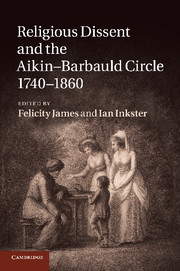Book contents
- Frontmatter
- Contents
- Notes on the editors and contributors
- Foreword
- Acknowledgements
- Chapter 1 Religious Dissent and the Aikin–Barbauld circle, 1740–1860
- Chapter 2 The Revd John Aikin senior
- Chapter 3 How Dissent made Anna Letitia Barbauld, and what she made of Dissent
- Chapter 4 ‘And make thine own Apollo doubly thine’
- Chapter 5 ‘Outline maps of knowledge’
- Chapter 6 ‘Under the eye of the public’
- Chapter 7 ‘The different genius of woman’
- Chapter 8 Lucy Aikin and the legacies of Dissent
- Chapter 9 The Aikin family, retrospectively
- Bibliography
- Index
- References
Chapter 7 - ‘The different genius of woman’
Lucy Aikin’s historiography
Published online by Cambridge University Press: 05 November 2011
- Frontmatter
- Contents
- Notes on the editors and contributors
- Foreword
- Acknowledgements
- Chapter 1 Religious Dissent and the Aikin–Barbauld circle, 1740–1860
- Chapter 2 The Revd John Aikin senior
- Chapter 3 How Dissent made Anna Letitia Barbauld, and what she made of Dissent
- Chapter 4 ‘And make thine own Apollo doubly thine’
- Chapter 5 ‘Outline maps of knowledge’
- Chapter 6 ‘Under the eye of the public’
- Chapter 7 ‘The different genius of woman’
- Chapter 8 Lucy Aikin and the legacies of Dissent
- Chapter 9 The Aikin family, retrospectively
- Bibliography
- Index
- References
Summary
In its composition, the objects in view have been perspicuity and order in narrative, selection of the most important circumstances, and a strict impartiality, exhibited not only in a fair and ungarbled representation of facts, but in the absence of every kind of colouring which might favour the purposes of what may properly be denominated party. This last intention, which has never ceased to guide the writer’s pen, did not appear to him necessarily to preclude every expression of his feelings on points involving moral or constitutional questions.
John Aikin, Annals of the Reign of King George the ThirdIn the study of history the different genius of woman I imagine will show itself. The detail of battles, the art of sieges, will not interest her so much as manners and sentiment: this is the food she assimilates to herself.
Anna Barbauld, ‘On Female Studies’Lucy Aikin was best known in her lifetime, and for many decades thereafter, for her three, two-volume court histories, Memoirs of the Court of Queen Elizabeth (1818), Memoirs of the Court of James the First (1822) and Memoirs of the Court of Charles the First (1833). They were published by Longman, one of the leading presses of the day: their titles included the Edinburgh Review and their authors included Wordsworth, Coleridge, Southey, Moore and Scott. All of Aikin’s histories sold well: Elizabeth was in its fourth edition in 1819, a year after its debut, and its eighth printing by 1869; James was in its third edition in 1823; and Charles was in its second edition within the first few months of its publication. The Memoirs were popular in America and the Continent as well: Elizabeth was first printed in America in 1821, with at least four more printings by 1870, and it was translated into German in 1819, Dutch in 1821 and French in 1827. James and Charles were both reprinted in America in the first year of their appearance. Lengthy, largely favourable reviews in the major periodicals of the day signalled the importance of the Memoirs. The Eclectic Review spoke for many when it declared, in 1819, that with Elizabeth readers were ‘put into possession of more correct information relating to those times, than they could obtain from any other single work’. Fifteen years later, in 1834, an American reviewer summed up her achievement as follows: ‘Aikin has done more to illustrate modern English history than almost any of the numerous and able writers, who, within the last fifty years, have turned their attention to the subject.’ Readers were impressed by Aikin’s skill in marshalling a large body of material – gathered from both print and manuscript collections, in private hands and public institutions, scattered across the country – and transforming it into an entertaining, elegant and scrupulously objective narrative covering the period from Elizabeth’s birth in 1533 to Charles I’s death in 1649.
- Type
- Chapter
- Information
- Religious Dissent and the Aikin-Barbauld Circle, 1740–1860 , pp. 156 - 182Publisher: Cambridge University PressPrint publication year: 2011



